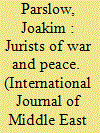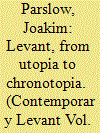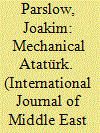|
|
|
Sort Order |
|
|
|
Items / Page
|
|
|
|
|
|
|
| Srl | Item |
| 1 |
ID:
158371


|
|
|
|
|
| Summary/Abstract |
The jurists who entered Turkish academia during the 1930s built the foundations of their discipline under a regime that became increasingly authoritarian as war drew closer. Like their peers in Italy and France, therefore, they had to produce coherent doctrines but also support the frequent use of exceptional emergency powers. How did they solve this contradiction? More importantly, what consequences did their solutions have for the use of emergency powers after the war? This article adopts a Deleuzian reading of two strategies with which Turkish jurists met that challenge, approaching their work not simply as theories about law but also as models for the role law should play in the articulation of public authority. Focusing on Ali Fuad Başgil and Sıddık Sami Onar, law professors at Istanbul University, I argue that although both professors supported the regime, only a situational doctrine of the kind Onar produced was capable of ensuring that jurists would have a place in the exercise of “exceptional” state powers after the 1950 transition to democracy.
|
|
|
|
|
|
|
|
|
|
|
|
|
|
|
|
| 2 |
ID:
172374


|
|
|
|
|
| Summary/Abstract |
This essay responds to this special issue’s challenge of thinking the Levant through Bakhtin’s notion of the chronotope, with a theoretical reflection on the potentials and limitations of chronotopic thought in social and historical scholarship. The essay is structured around two questions. First, given the overwhelmingly literary associations with which we tend to approach Bakhtin’s thought today, is the chronotope a tool for literary analysis only, or is it applicable to other forms of communication, cognition, and action? Second, what implications does chronotopic analysis have for scholarship that seeks methods of analysing and writing about the Levant in a historically and politically responsive way? Should chronotopes always be understood as the a priori horizon of meaningful narration, as frameworks that make certain plots, events, interpretations, and actions possible while precluding others, or are they also an observable and manipulatable aspect of communication, one that can be subject to the quotidian equivalent of authorial intention, creative reception, and political contestation? Placing the chronotope in the context of Bakhtin’s earlier philosophical project, I argue that although the chronotope facilitates the reflexivity and subversiveness which Bakhtin sees as defining and ethically necessary achievements of modern discourse, these characteristics are both self-limiting and morally ambiguous.
|
|
|
|
|
|
|
|
|
|
|
|
|
|
|
|
| 3 |
ID:
182840


|
|
|
|
|
| Summary/Abstract |
Turkey's 1960 military coup d’état was received by Kemalists in the courts, bureaucracy, and universities as an opportunity to reinvigorate Atatürk's ideal of a centralized and rationally organized state. This article investigates how a handful of avant-garde thinkers sought to ride the post-1960 wave of reformism by promoting a techno-utopian approach to governance through publications and seminars aimed at state leaders and intellectuals. Cybernetics, they argued, offered a paradigm of adjudication and administration unblemished by association with the ascendant ideologies of the Cold War, whether socialist or conservative, and was fully in keeping with Kemalism. I argue that, although it remained largely at the stage of fantasy, Turkish cybernetics ultimately served as a set of metaphors with which conservative state thinkers from different political camps found common ground, facilitating the shift that occurred within the state during the 1970s away from the rights-based pluralism of the Constitution of 1961 and toward an effort to de-radicalize Turkish society, if necessary through violence.
|
|
|
|
|
|
|
|
|
|
|
|
|
|
|
|
|
|
|
|
|